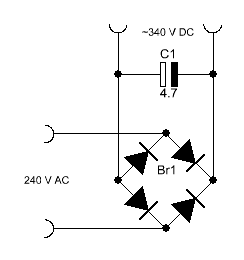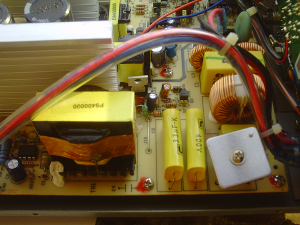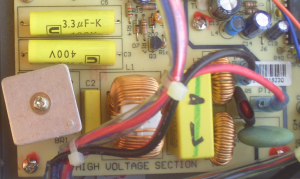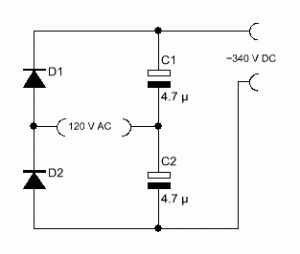Operating a 240 V / 50 Hz switch mode power supply on 120 V / 60 Hz is not necessarily impossible even if the power supply has no input voltage selector or explicitly demands a higher voltage. A little change of the input circuitry does the trick.
WARNING: This article is for information purposes only. Only absolute experts who understand all security related aspects of this modification should consider doing this on their own risk. Improper precautions may cause fire, serious injury and / or death.
The first stage in a switch mode power supply is a rectifier. The mains voltage is being rectified and smoothed.
In case of my Peaktech 1540 a bridge rectifier and two 3.3 µF capacitors take care of this part. The Peaktech 1540 is one OEM name of the Manson SPS9400. Other names include Jaycar Powertech MP3090 and BK Precision 1692.
What one essentially needs to do in order to use a 240V / 50 Hz switch mode power supply with 120 V / 60 Hz is to find a circuit that replaces the circuit above at 120 V / 60 Hz and acts equivalent. Luckily, a Delon voltage doubler circuit can do this perfectly.
Basically, the diodes make sure that C1 and C2 get charged alternately. One capacitor gets charged during the positive half-wave of the mains cycle and the other capacitor gets charged during the negative half-wave. For the DC output side of the circuit both capacitors appear in series and therefore with twice the voltage compared to C1 and C2 individually.
Care needs to be taken to pick the right size capacitor values for C1 and C2. If the values are too big, the diodes might not like the high currents and create some magic smoke [1] and refuse further service. If the capacitors are too small, the energy stored in the caps may not be enough for the following stages in the power supply.
I personally usually look up the overall capacitance of the next stage in the power supply and try to use about twice that capacity. That compensates for the charging rate difference due to the different frequencies. The original bridge rectifier effectively doubles the European 50 Hz mains and re-charges the original caps at a rate of 100 Hz. The Delon voltage doubler preserves the mains frequency, in this case 60 Hz. So essentially the capacitors need to ‘wait’ a bit longer until they get a new load of electrons.
CAVEAT: It is important to understand that the modified device will draw approximately twice the current at 120 V / 60 Hz than it would draw at 240 V / 50 Hz. Important parts of the device, such as power connectors / wires and EMI-Filters, may not be designed for such high currents. Failure to modify those parts may result in fire or explosion causing property damage, personal injury, or death.
Links and Sources:
[1] Wikipedia, Magic Smoke http://en.wikipedia.org/
Westerhold, S. (2012), "Modifying a 240V / 50 Hz switch mode power supply for 120 V / 60 Hz". Baltic Lab High Frequency Projects Blog. ISSN (Online): 2751-8140., https://baltic-lab.com/2012/09/modifying-a-240v-50-hz-switch-mode-power-supply-for-120-v-60-hz/, (accessed: January 16, 2026).
- Conducted Emissions on the Bench: Implementing the CISPR 25 Voltage Method - December 15, 2025
- WebP-Images without Plugin - January 14, 2025
- Firewall Rules with (dynamic) DNS Hostname - January 14, 2025



